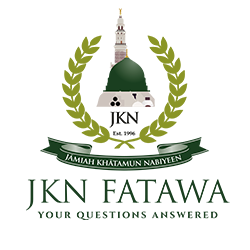15th January 2024
السلام عليكم و رحمة الله و بركاته
Question: Are cosmetics with phenoxyethanol and Ethyl Hexanediol permissible to use? If not does it invalidate the Salāh and would Qadha be necessary?
الجواب حامداً و مصلياً
In the name of Allāh, the Most Gracious, the Most Merciful
Answer
Phenoxyethanol is a colourless, oily, synthetic liquid that is largely used as a preservative in vaccines and cosmetics. It is chemically an ‘alcohol’ and is industrially manufactured – not fermented. [1] Ethyl Hexanediol is a colourless, viscous, synthetic liquid that is largely used as a solvent in cosmetic products. This is also chemically an ‘alcohol’ and is industrially manufactured – not fermented. [2]
In the modern era, there exists an overwhelming prevalence of alcohol in many frequently used items. The solution is that there is a hadith of the Prophet ﷺ where he stated; “Khamr (alcohol) comes from two trees: grapes and dates” [3]
Based on this hadith, the Hanafi jurists have classified alcohol into two types: khamr haqeeqi and khamr ghayr haqeeqi. The alcohol that is produced from dates and grapes falls into the category of khamr haqeeqi (real alcohol). Khamr haqeeqi is impure and categorically forbidden to drink whether in small quantity or large quantity. Khamr ghayr haqeeqi (figurative alcohol) is that which is not sourced from dates or grapes but from other beverages. Imam Abu Hanifah considered this type as pure but prohibited to drink for the purpose of leisure and intoxication. [4] For a more detailed explanation regarding this subject matter, see the article titled “Alcohol contained Products – A detailed Answer”.[5]
Therefore, phenoxyethanol and Ethyl Hexanediol are both synthetically produced alcohol and not fit for drinking. Both fall under the similar ruling as khamr ghayr haqeeqi, as in both are pure rendering them permissible for external use and as of which, the Salāh will not break. It is important to note that the current position in the Hanafi fiqh is that alcohol of all types of beverages are prohibited to drink. The leniency applies only when it is found in everyday products in minute quantity except for alcohol sources from grapes and dates.
[Allāh Knows Best]
Written by: Maulana Hafiz Mahmud Ali Reviewed by: Mufti Abdul Waheed
Attested by: Shaykh Mufti Saiful Islam
JKN Fatawa Department
[1] Helmut Fiege; Heinz-Werner Voges; Toshikazu Hamamoto; Sumio Umemura; Tadao Iwata; Hisaya Miki; Yasuhiro Fujita; Hans-Josef Buysch; Dorothea Garbe (2007). “Phenol Derivatives”. Ullmann’s Encyclopaedia of Industrial Chemistry. Weinheim: Wiley-VCH.
[2] Andersen, F. A. “Final Report on the Safety Assessment of Ethyl Hexanediol.” Journal of the American College of Toxicology 13.6 (1994): 418-436.
[3] Sunan Ibn Majah; hadith no: 3378
الْخَمْرُ مِنْ هَاتَيْنِ الشَّجَرَتَيْنِ النَّخْلَةِ وَالْعِنَبَةِ
[4] Jawharatun Niyyarah, Kitabul Ashribah v.2 p.174
الْأَشْرِبَةُ جَمْعُ شَرَابٍ قَالَ – رَحِمَهُ اللَّهُ – (الْأَشْرِبَةُ الْمُحَرَّمَةُ أَرْبَعَةٌ: الْخَمْرُ وَهُوَ عَصِيرُ الْعِنَبِ) يَعْنِي النِّيءَ مِنْهُ (إذَا غَلَى وَاشْتَدَّ وَقُذِفَ بِالزَّبَدِ) مِنْ دُونِ أَنْ يُطْبَخَ. قَوْلُهُ: (وَالْعَصِيرُ إذَا طُبِخَ حَتَّى ذَهَبَ أَقَلُّ مِنْ ثُلُثَيْهِ) وَيُسَمَّى الطِّلَاءُ. قَوْلُهُ: (وَنَقِيعُ التَّمْرِ إذْ اشْتَدَّ وَغَلَى) وَيُسَمَّى السَّكَرُ (وَ) نَقِيعُ (الزَّبِيبِ إذَا غَلَى وَاشْتَدَّ) ، وَالْكَلَامُ فِي الْخَمْرِ فِي عَشَرَةِ مَوَاضِعَ أَحَدُهَا فِي بَيَانِ مَاهِيَّتِهَا وَهِيَ النِّيءُ مِنْ مَاءِ الْعِنَبِ إذَا صَارَ مُسْكِرًا، وَالثَّانِي فِي حَدِّ ثُبُوتِ هَذَا الِاسْمِ وَهَذَا الَّذِي ذَكَرَهُ مَنْ اشْتَرَطَ الْقَذْفَ بِالزَّبَدِ هُوَ قَوْلُ أَبِي حَنِيفَةَ وَعِنْدَهُمَا إذَا اشْتَدَّ وَغَلَى وَلَا يُشْتَرَطُ الْقَذْفُ بِالزَّبَدِ، وَالثَّالِثُ إنَّ عَيْنَهَا حَرَامٌ غَيْرُ مَعْلُولٍ بِالسُّكْرِ وَلَا مَوْقُوفٍ عَلَيْهِ لِأَنَّهَا رِجْسٌ، وَالرِّجْسُ مُحَرَّمُ الْعَيْنِ، وَالرَّابِعُ أَنَّهَا نَجِسَةٌ نَجَاسَةً مُغَلَّظَةً كَالْبَوْلِ، وَالْخَامِسُ أَنَّهُ يَكْفُرُ مُسْتَحِلُّهَا، وَالسَّادِسُ سُقُوطُ تَقَوُّمِهَا فِي حَقِّ الْمُسْلِمِ حَتَّى لَا يَضْمَنَ مُتْلِفُهَا وَغَاصِبُهَا وَلَا يَجُوزُ بَيْعُهَا لِأَنَّ اللَّهَ تَعَالَى لَمَّا نَجَّسَهَا فَقَدْ أَهَانَهَا، وَالتَّقَوُّمُ يُشْعِرُ بِعِزَّتِهَا وَمَنْ كَانَ لَهُ عَلَى مُسْلِمٍ دَيْنٌ فَأَوْفَاهُ مِنْ ثَمَنِ خَمْرٍ لَا يَحِلُّ لَهُ أَنْ يَأْخُذَهُ وَلَا يَحِلُّ لِلْمَدْيُونِ أَنْ يُؤَدِّيَهُ لِأَنَّهُ ثَمَنُ بَيْعٍ بَاطِلٍ وَإِنْ كَانَ الدَّيْنُ عَلَى ذِمِّيٍّ فَإِنَّهُ يُؤَدِّيهِ مِنْ ثَمَنِ الْخَمْرِ وَلِلْمُسْلِمِ أَنْ يَسْتَوْفِيَهُ مِنْهُ لِأَنَّ بَيْعَهَا فِيمَا بَيْنَهُمْ جَائِزٌ، وَالسَّابِعُ: حُرْمَةُ الِانْتِفَاعِ بِهَا لِأَنَّ الِانْتِفَاعَ بِالنَّجِسِ حَرَامٌ وَلِأَنَّ الْخَمْرَ وَاجِبُ الِاجْتِنَابِ، وَفِي الِانْتِفَاعِ بِهِ اقْتِرَابٌ قَالَ اللَّه تَعَالَى: {فَاجْتَنِبُوهُ} [المائدة: ٩٠] ، وَالثَّامِنُ: أَنَّهُ يُحَدُّ شَارِبُهَا وَإِنْ لَمْ يَسْكَرْ مِنْهَا لِقَوْلِهِ – عَلَيْهِ السَّلَامُ – «مَنْ شَرِبَ الْخَمْرَ فَاجْلِدُوهُ فَإِنْ عَادَ فَاجْلِدُوهُ فَإِنْ عَادَ فَاجْلِدُوهُ
Kasān, Badā’i Sanāi, Kitāb al-Ashribah, vol 5. P. 114-116
(وَأَمَّا) السَّكَرُ وَالْفَضِيخُ وَنَقِيعُ الزَّبِيبِ فَيَحْرُمُ شُرْبُ قَلِيلِهَا وَكَثِيرِهَا لِمَا رُوِيَ عَنْ النَّبِيِّ – عَلَيْهِ الصَّلَاةُ وَالسَّلَامُ – أَنَّهُ قَالَ: – «الْخَمْرُ مِنْ هَاتَيْنِ الشَّجَرَتَيْنِ وَأَشَارَ – عَلَيْهِ الصَّلَاةُ وَالسَّلَامُ – إلَى النَّخْلَةِ وَالْكَرْمَةِ» وَاَلَّتِي هَهُنَا هُوَ الْمُسْتَحِقُّ لِاسْمِ الْخَمْرِ فَكَانَ حَرَامًا…..
(وَأَمَّا) الْمُعَتَّقُ الْمُسْكِرُ فَيَحِلُّ شُرْبُهُ لِلتَّدَاوِي وَاسْتِمْرَاءِ الطَّعَامِ وَالتَّقَوِّي عَلَى الطَّاعَةِ عِنْدَ أَبِي حَنِيفَةَ وَأَبِي يُوسُفَ – رَضِيَ اللَّهُ عَنْهُمَا – وَرَوَى مُحَمَّدٌ – رَحِمَهُ اللَّهُ – أَنَّهُ لَا يَحِلُّ، وَهُوَ قَوْلُ الشَّافِعِيِّ – رَحِمَهُ اللَّهُ – وَأَجْمَعُوا عَلَى أَنَّهُ لَا يَحِلُّ شُرْبُهُ لِلَّهْوِ وَالطَّرَبِ كَذَا رَوَى أَبُو يُوسُفَ – رَحِمَهُ اللَّهُ – فِي الْأَمَالِي وَقَالَ لَوْ أَرَادَ أَنْ يَشْرَبَ الْمُسْكِرَ فَقَلِيلُهُ وَكَثِيرُهُ حَرَامٌ وَقُعُودُهُ لِذَلِكَ وَالْمَشْيُ إلَيْهِ حَرَامٌ.
[5] Mufti Abdul Waheed, (2020), Alcohol contained Products – A detailed Answer, Available at: https://jknfatawa.co.uk/islamic-ruling-on-alcohol-contained-products/
